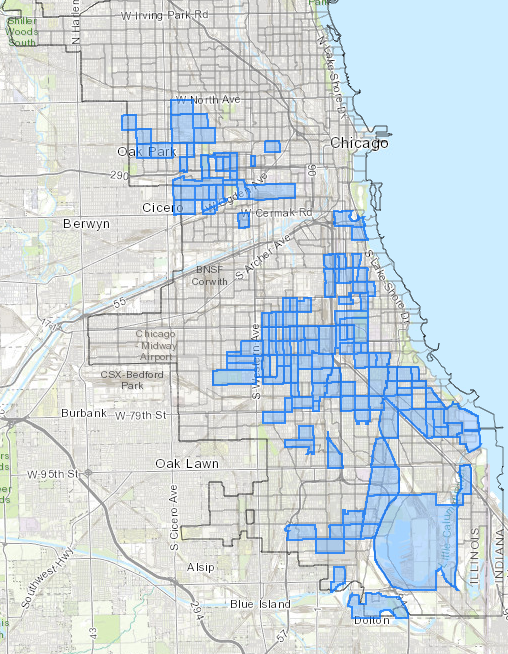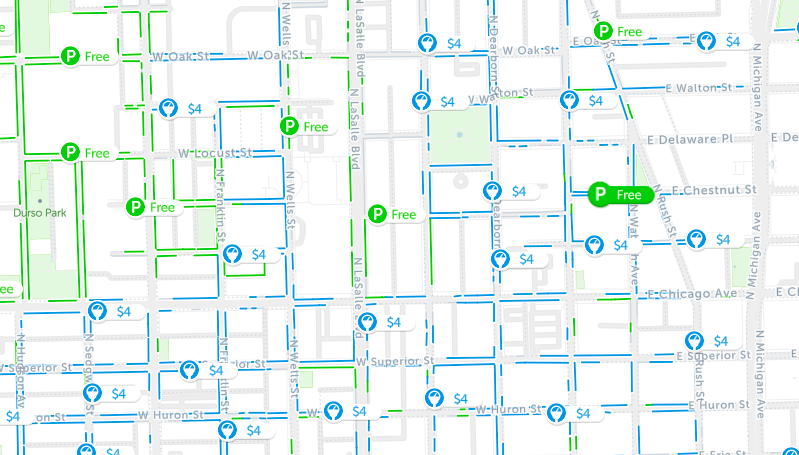Navigating Chicago’s Residential Parking Zones: A Comprehensive Guide
Related Articles: Navigating Chicago’s Residential Parking Zones: A Comprehensive Guide
Introduction
With great pleasure, we will explore the intriguing topic related to Navigating Chicago’s Residential Parking Zones: A Comprehensive Guide. Let’s weave interesting information and offer fresh perspectives to the readers.
Table of Content
Navigating Chicago’s Residential Parking Zones: A Comprehensive Guide
Chicago’s vibrant urban landscape is renowned for its bustling streets and diverse neighborhoods. However, the city’s popularity also presents a challenge: finding parking. To address this, Chicago has implemented a system of residential parking zones, creating a more equitable and efficient parking environment for residents.
This comprehensive guide delves into the intricacies of Chicago’s residential parking zones, offering an in-depth understanding of their purpose, implementation, and benefits. By dissecting the map, understanding the rules, and exploring available resources, residents and visitors can navigate the city’s parking landscape with ease.
Understanding the System: A Map of Dedicated Parking
Chicago’s residential parking zones are a network of designated areas, each marked with a unique zone number. These zones are designed to prioritize parking for residents living within the designated boundaries. By restricting parking to permit holders, the city aims to alleviate street congestion and improve the quality of life for local communities.
A Visual Guide: Deciphering the Zones
The heart of the system lies in the Residential Parking Zone Map. This map, readily accessible online and through various city resources, visually represents the city’s parking zones. Each zone is marked with a distinct number, allowing residents to easily identify their designated parking area.
The Importance of Permits: Securing Your Spot
To park within a residential zone, residents must obtain a Residential Parking Permit. These permits, available through the City of Chicago’s Department of Transportation, provide residents with the necessary authorization to park within their designated zone.
Navigating the Permit Application Process:
Applying for a residential parking permit is a straightforward process. Residents can submit their applications online, through the mail, or in person at designated locations. The application requires basic information, including proof of residency and vehicle registration.
Types of Permits: Tailored Parking Solutions
Chicago offers various types of residential parking permits to accommodate diverse needs:
- Standard Permit: This permit is the most common type and allows residents to park within their designated zone.
- Temporary Permit: This permit is ideal for short-term residents, offering temporary parking privileges within a specific zone.
- Visitor Permit: This permit allows visitors to park within a designated zone for a limited duration, providing convenient parking options for guests.
- Disability Permit: This permit is designed for individuals with disabilities, offering accessible parking options within the designated zone.
Beyond the Zones: Guest Parking Options
While residential parking permits are designed for residents, the city recognizes the need for convenient parking options for guests. Several guest parking alternatives are available, including:
- Visitor Parking Permits: These permits, issued to residents, allow visitors to park within a designated zone for a limited time.
- Street Parking: For visitors who do not require overnight parking, street parking remains an option, subject to the city’s parking regulations.
- Private Garages and Parking Lots: Numerous private garages and parking lots offer convenient and secure parking options for visitors.
Enforcement and Regulations: Ensuring Orderly Parking
To maintain the integrity of the residential parking zones, the city enforces a strict set of regulations. Parking enforcement officers patrol designated areas, issuing citations to vehicles parked in violation of zone regulations.
Common Violations: Understanding the Rules
The following are common violations that can lead to citations:
- Parking without a valid permit: Vehicles without a valid residential parking permit are subject to ticketing.
- Parking outside designated zone: Vehicles parked outside their designated zone, even with a valid permit, are subject to ticketing.
- Parking in prohibited areas: Certain areas within residential zones, such as fire lanes and loading zones, are strictly prohibited for parking.
- Parking in violation of time limits: Visitors using visitor parking permits must adhere to the specified time limits to avoid citations.
Addressing Parking Challenges: Resources and Solutions
The City of Chicago provides various resources and solutions to address parking challenges within residential zones:
- Online Resources: The City’s website offers comprehensive information on residential parking zones, including FAQs, permit application forms, and parking regulations.
- Customer Service: The Department of Transportation provides customer service support to address inquiries and resolve parking-related issues.
- Community Engagement: The city encourages community engagement to address parking concerns and propose solutions tailored to specific neighborhoods.
FAQs: Demystifying Residential Parking Zones
Q: What are the benefits of residential parking zones?
A: Residential parking zones offer several benefits, including:
- Reduced street congestion: By restricting parking to permit holders, zones alleviate street congestion, improving traffic flow.
- Increased parking availability for residents: Zones ensure that residents have access to parking spaces within their neighborhoods.
- Enhanced quality of life: Reduced congestion and increased parking availability contribute to a more peaceful and livable environment for residents.
- Fairer distribution of parking resources: Zones create a more equitable distribution of parking resources, preventing non-residents from monopolizing parking spaces.
Q: How do I know if I live in a residential parking zone?
A: The Residential Parking Zone Map, available online and through city resources, clearly identifies all residential parking zones. You can also check the street signs for the zone number.
Q: Can I park in a residential zone without a permit?
A: No, parking in a residential zone without a valid permit is prohibited and subject to ticketing.
Q: What happens if I receive a parking ticket?
A: Parking tickets must be paid within a specified time frame to avoid penalties. You can pay tickets online, by mail, or in person at designated locations.
Q: Are there any exemptions to the residential parking zone rules?
A: Yes, certain exemptions may apply, such as for vehicles with disability permits, vehicles used for official business, and vehicles involved in emergency situations.
Q: Can I get a visitor permit for my guest?
A: Yes, you can obtain visitor permits for your guests, allowing them to park within your designated zone for a limited time.
Q: What if there are no parking spaces available within my zone?
A: If all spaces within your zone are occupied, you can explore alternative parking options, such as street parking in nearby zones or private garages and parking lots.
Tips for Navigating Residential Parking Zones
- Plan ahead: Familiarize yourself with the residential parking zone map and your designated zone before you travel.
- Obtain a permit: If you reside in a residential zone, ensure you have a valid permit to park within your designated area.
- Adhere to time limits: If using a visitor permit, carefully observe the specified time limits to avoid citations.
- Park legally: Avoid parking in prohibited areas, such as fire lanes and loading zones.
- Check for signs: Always pay attention to street signs indicating parking restrictions and regulations.
- Be courteous: Consider other residents and visitors when parking, leaving sufficient space for safe passage.
Conclusion: A System for Orderly Parking
Chicago’s residential parking zones are a vital component of the city’s transportation infrastructure, ensuring a more equitable and efficient parking environment for residents. By understanding the system, obtaining permits, and adhering to regulations, residents and visitors can navigate the city’s parking landscape with ease and contribute to a more orderly and enjoyable experience for all.







Closure
Thus, we hope this article has provided valuable insights into Navigating Chicago’s Residential Parking Zones: A Comprehensive Guide. We appreciate your attention to our article. See you in our next article!